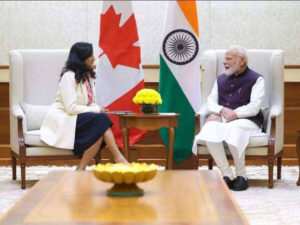Digital News Guru National Desk:
India and Canada Forge New Roadmap to Strengthen Bilateral Ties
- India and Canada have finalized a new roadmap to strengthen and “revive” their bilateral relationship, following talks between their external/foreign ministers in New Delhi: S. Jaishankar (India) and Anita Anand (Canada).
- The move comes after a period of strained relations, especially following the killing of a Sikh separatist in Canada and related diplomatic tensions.

What the roadmap covers
The joint statement between India and Canada outlines areas and mechanisms of cooperation they intend to pursue. Some of the major components:
- Trade, investment, and economic ties
The nations will deepen trade and investment cooperation. India-Canada bilateral trade reached about US$23.66 billion in 2024. Initiatives include ministerial-level discussions, early action in priority sectors (like clean technology, infrastructure, agri-food & digital innovation), and reviving forums such as the Canada-India CEO Forum to engage business leaders. - Climate, energy, environment collaboration
They plan to scale up cooperation in renewable energy, decarbonisation of heavy industries, managing pollutants, increasing green technologies, and improving sustainable consumption. Also, relaunching or reinforcing dialogues on energy, possibly including green hydrogen, biofuels, grid modernisation, cleaner fuels, etc. - Science, Technology & Innovation
Both countries will revive or strengthen scientific and tech cooperation (Joint Science & Technology Cooperation Committee, AI collaboration, digital public infrastructure, etc.) - People-to-people ties, education, culture
Enhancing mobility of people, academic exchanges, possibly Canadian academic presence in India via overseas campuses, cooperation in tourism, cultural exchanges. - Governance & diplomatic protocols
Emphasis on principles like mutual respect, rule of law, sovereignty, territorial integrity. Institutional capacity building via High Commissions, consulates etc., and increasing engagements among provinces/states on both sides for economic cooperation.
Significance & context
- This roadmap is an attempt to repair and reinvigorate India-Canada ties after diplomatic tensions.

- Global shifts in trade, supply chains, geopolitical alliances have made strong bilateral partnerships important. Both countries are seeking to reduce over-dependence on single partners and build more robust economic, security, and climate linkages.
- The roadmap signals that despite past disputes, there’s willingness from both sides to work on shared interests: trade, environment, tech, people-to-people relations. It is more than just a diplomatic gesture—it lays out specific sectors and timelines.
What are the challenges & what to watch
- Implementation vs. Intent: Roadmaps are good on paper; what matters is follow-through. Ensuring that ministerial dialogues, forums, and joint committees actually meet, deliver, and aren’t delayed will be key.
- Trust deficit: Given past strains (especially due to allegations around the killing of the Sikh separatist), there may be suspicion or demands for accountability. Building trust will take time.
- Domestic politics & perceptions: How each side handles internal pressures — from media, diaspora communities, civil society — will matter. Missteps or perceived lack of transparency can derail progress.
- Coordination across states / provinces: Since parts of the roadmap involve subnational actors (Indian states, Canadian provinces), coordination across layers of government will be essential but also potentially tricky.
- Global economic headwinds & climate/environment constraints: Energy, climate, tech cooperation are subject to resource constraints, regulatory hurdles, supply chain constraints etc. Both sides will need to navigate tradeoffs.

Bottom line
The India-Canada new roadmap is a meaningful reset of bilateral relations, aiming to move from tension toward cooperation across trade, innovation, climate, and people-centric sectors. It reflects current global realities where democracies are seeking to strengthen strategic and economic ties. Whether the roadmap is transformative will depend on how concrete the follow-ups are, how resilient the mutual trust becomes, and how effectively both sides deliver in priority areas.
The establishment of a new roadmap between India and Canada marks a significant step towards strengthening bilateral ties and fostering cooperation across various sectors. By focusing on shared interests and mutual benefits, both nations aim to build a resilient and dynamic partnership that can contribute positively to regional and global stability. The success of this initiative will depend on sustained engagement, effective implementation, and a commitment to addressing challenges collaboratively.
You May Also Read: Bihar: NDA’s Game Changer — BJP & JD(U) to Contest 101 Seats Each








